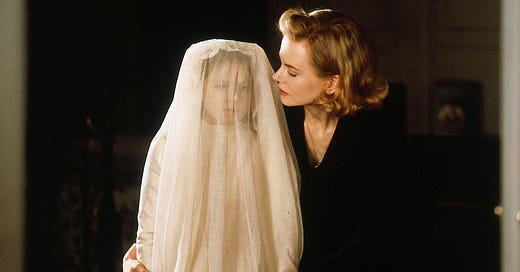The Others and Freaks have been initiated into the Criterion Collection, with unconfirmed reports of spontaneous “one of us!” chants breaking out across the country in celebration. They’re two of the more exciting additions in recent memory, with both offering bracing visions of families that have to be broken before they can be put back together. The former is being presented in 4K for the first time, while the latter has been bundled with two of its director’s lesser-known silent features: The Mystic and The Unknown. Physical media has rarely been more important than it is today, with more and more streaming services 86ing swaths of their libraries for shortsighted bottom-line concerns, and Criterion remains the gold standard.
Not until its all-time-great ending do you realize why The Others begins with Grace (Nicole Kidman) screaming in terror after waking from a half-remembered nightmare or worse, but by then it’s too late — for her if not for us. Alejandro Amenábar’s inverted ghost story is unsettling from the very first, but aside from that blood-curdling shriek it’s usually the quiet that gets you. Grace is a harsh, devoutly religious woman who spends most of her time tending to her two children, Anne (Alakina Mann) and Nicholas (James Bentley), whose shared photosensitivity is so severe it necessitates drawing every curtain in their remote, cavernous home at all hours of the day. World War II has ended, but the children’s father has yet to return from the front to the Channel Island of Jersey. Why has he forsaken us, the three of them wonder, and will we ever see him again?
Unexplained noises — crying children, increasingly loud footsteps, a piano playing by itself — become more common after a trio of helpers is hired following their predecessors’ abrupt, unexplained departure, as are reports, all from Anne, that a boy named Victor insists this is his family’s house and its current residents will soon be forced to depart as well. At first she’s punished for telling what her mother claims are lies, but soon Grace senses these “intruders” as well. “They’re everywhere,” Anne says, “they say this house is theirs.” The little girl, who seems wholly unbothered by all this, is also the film’s best character — as sassy as she is precocious, Anne is also more in tune with what’s really going on than her mother or younger brother.
This is all very Turn of the Screw, with particular influence drawn from Jack Clayton’s 1961 adaptation The Innocents, but Amenábar’s film doesn’t suffer from the comparison. Much of it takes place in candlelight, with Grace’s face aglow as her expression grows ever more horrified at the realization that they are not alone in this house. After coming around to her daughter’s interpretation of events, Grace admits to feeling the presence of “something which is not at rest” — an apt description of the film itself, not to mention anyone watching it for the first time.
“We didn’t lie to you folks. We told you we had living, breathing, monstrosities. You laughed at them, shuddered at them. And, yet, but for the accident of birth, you might be one as they are. They did not ask to be brought into the world. But, into the world they came. Their code is a law unto themselves: offend one and you offend them all.”
The title, premise, and year of Freaks’ release all suggest something radically different from the actual movie Tod Browning made in 1932. Far from a cruel exploitation that makes us feel as though we’ve come to the circus to gawk at the eponymous sideshow performers, this vision of conjoined twins, little people, sword swallowers, bearded ladies, “pinheads,” and other societal castoffs is nothing if not compassionate. Browning cast actual veterans of the circus/carnival circuit to play versions of themselves, and at no point are they condescended to treated as lesser than.
The performers’ acceptance of one another is unconditional, their distrust of outsiders universal — and wholly justified. (If anything, they’re far kinder to normies than most of them deserve.) That such a daring, transgressive film was made by a major studio in the early ‘30s remains a marvel (thanks, Irving Thalberg); that it irreparably harmed the career of its director is disheartening if not surprising. “There is no excuse for this picture,” wrote John C. Moffitt of the Kansas City Star. “It took a weak mind to produce it and it takes a strong stomach to look at it.” The Hollywood Reporter, meanwhile, called it an “outrageous onslaught upon the feelings, the senses, the brains, and the stomachs of an audience.” Browning retired from filmmaking in 1939, and it wasn’t until the year of his death, 1962, that the critical reappraisal of Freaks began following a retrospective screening at the Venice Film Festival.
With a runtime of just 62 minutes, the main plot follows a conniving trapeze artist named Cleopatra (Olga Baclanova) who woos, manipulates, and marries the diminutive Hans (Harry Earles, who went on to play a Munchkin in The Wizard of Oz) for his inheritance and utterly humiliates him at their wedding feast — a transgression that goes neither unnoticed nor unpunished by his friends. That ceremony, in which she viciously rejects their initiation as “one of us,” is a haunting set piece that raises the movie’s central question: Who are the freaks again?
“Have I not told you God looks after all his children?” asks the group’s adoptive mother after a near-disaster is averted. Well, some better than others, hence the need for found families as resilient as this one.







The Others is in my top ten all-time favorites! Perfect movie 🏆